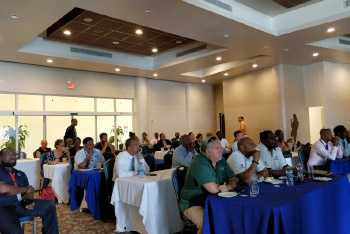News & Media

Netherlands Aerospace Centre presents findings on Airspace and Aerodrome Capacity Study

Stakeholders and SXM Airport staff at the presentation of the Airspace and Aerodrome Capacity Study.
SIMPSON BAY, St. Maarten (Tuesday August 13, 2019) – In an initiative set forth by the Princess Juliana International Airport (SXM), the representative of the Netherlands Aerospace Center (NLR) Jan-Hein Dronkelaar declared his findings on the aircraft movements within the Terminal Control Area (TMA) and the aerodrome at the extraordinary stakeholder’s info-session. The closed session was hosted at the Simpson Bay Resort Conference room on Thursday August 1, 2019. NLR has been in existence for 100 years, with the goal to make the world of transport safer, more sustainable, more efficient and more effective.
The Princess Juliana International Airport have been prepared for this info session since the study was concluded in 2017. The first presentations were completed prior to Hurricane Irma, but the efforts were halted due to the damages sustained. The overall results concluded that we were able to identify our capacity for both the SXM Airport and the airspace that our ATC unit controls.
The recent presentation gave insight into the current state of the island’s airlift capacity and how best to safely maximize airlift, whilst improving the capacity due to traffic surges. The Netherlands Aerospace Center worked jointly with the Air Traffic Services (ATS) to evaluate the possibility of airspace layout design changes.
In addition to airspace redesign, infrastructure improvements will have to be made in the future which should take operational requirements into consideration, as development progresses in a logical and results oriented approach. The findings also considered the complexity of the current operations, as it analyzed the controller workload.
Invited guests included the honorable Minister of Tourism, Economic Affairs, Transportation and Telecommunication (TEATT), Stuart Johnson, the Dutch and French tourist offices, Management of the Edeis Aeroport Saint–Martin Grand Case, St. Maarten Hospitality and Trade Association (SHTA), the St. Maarten Harbor Group of Companies, St. Maarten Civil Aviation Authority, Airline Representatives, Hoteliers, Menzies (Ground Handling Company), and the airlines and handlers of the PJIAE.
"Statistical information that is used to decipher the airport's capacity is integral to its redevelopment as the number one gateway in the region. Understanding how to maximize the use of our airspace plays a crucial role in how fast we in St. Maarten can increase our airlift. The Airspace and Aerodrome Capacity Study is a valuable tool that would shape our future decisions,” stated the Honorable Stuart Johnson Minister of Tourism, Economic Affairs, Transport & Telecommunication (TEATT).
"The presentation on the study further highlights the need for collective solutions, which meets the current and future demand. All stakeholders should be included to harmonize the airport's future infrastructure and operational advancements. NRL was selected to conduct this study due to their vast experience in this field of expertise,” added the Manager of Air Traffic Services, Gregory Hassell.
“It is imperative that everyone in the tourism industry is aware of the capabilities of our ports of entry, with SXM Airport being a key driver. Driving our tourism product is one thing but making sure that our visitors arrive and depart from our airport and airspace safely, should be everyone’s concern. Tourism demands are getting back to pre-Irma levels, and we need to be vigilant in our approach when planning to increase airlift to the island. Therefore, it was important for the tourist offices from both sides of the island to attend the info-session in the company of the airline representatives/handlers, so they can realize what challenges our airport and Air Traffic Control units are faced with and be part of the discussions going forward,” concluded Manager of the ATS Training and Development Duncan Van Heyningen.
The results from the study showed that the runway capacity of PJIAE during the busier winter season is reaching its limitations. Adding anymore capacity means that the scheduling of new flights must be spread around the peak hours of 11:00am–3:00pm during which there is ample capacity available.
 84°F / 29°C
84°F / 29°C

